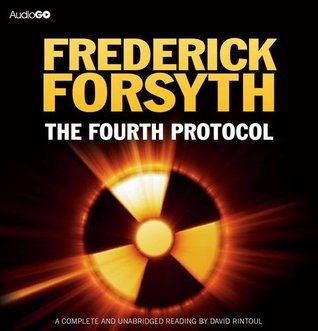"THE FOURTH PROTOCOL" by Frederick Forsyth
Another classic Frederick Forsyth thriller from the Cold War era, whose age (both the actual publication date and the storyline take place during Margaret Thatcher's tenure as Prime Minister of the UK) does not diminish the enjoyability of the novel. This one pits MI5 officer John Preston--an intelligent and skilled operative whose career growth and ability to do his job is frequently stymied by his pompous jackass boss Brian Harcourt-Smith--against KGB super-spy Major Valeri Petrofsky (AKA "James Duncan Ross"). Petrofsky is dispatched by high-ranking rogue elements in the Soviet, including no less than the (fictitious) General Secretary of the USSR and (real-life) infamous British traitor Kim Philby, to set off a (relatively) small-scale nuclear explosion in the UK and thus influence British elections in favour of the country's radical, anti-military, and anti-American left-wingers.
The book is replete with Forsyth's delightfully sarcastic wit and encyclopaedic eye for detail (whether the subject is geographical, political, or administrative in nature), as well as insightful perspective on British and Soviet intelligence agencies alike as well as left-wing elements of British politics in the 1980s.
RANDOM STREAM OF CONSCIOUSNESS NOTES AND OBSERVATIONS (and noteworthy passages):
--p. 6: "Billy knew the door was secured by a shunt lock, which he had gratefully identified as a Chubb rather than a Brahmah, which is reputedly unpickable." Hmmm, I wonder what Fiona Glenanne of "Burn Notice" would say about that? ;-)
--p. 8: Shouldn't "Committee of State Security" actually be "Committee *for* State Security?"
--p. 9: "Burgess, drinking and buggering his way to an early grave." Good riddance to that commie bugger!
--p. 30: Haha, Permanent Under Secretary = "PUS." What would Demo Dick Marcinko think?
--p. 34: "'one of nature's bachelors,'" haha, good one,never heard that particular slang phrase before.
Lady Fiona Glen....the eventual inspiration for the name of the Fiona Glenanne character from "Burn Notice," perhaps?
--p. 41: the civil service unions had recruited so many staffers with extreme-left political views" Hey wow, just like in the US of A!
--p. 47: Um, Mr. Forsyth, the Browning Hi-Power 9mm doesn't have a fully "Automatic" capability.
--p. 54: "wearing a nice new lines in concrete underpants," haha, nice one.
--pp. 56-57: "the bedrock of Marxism-Leninism in Britain has always been in the trade union movement" Gee, what a shocker.
--p. 78: "but the Chaika with the MOC license plates had sped down the center lane reserved for the *vlasti*, the elite, the fat cats in what Marx had dreamed would be a classless socirty--it had become a society rigidly structured, layered, and class-ridden as only a vast bureaucratic hierarchy can be." Oh, snap! A stinging indictment of Communism. (BTW, wouldn't another term for "vlasti" be "nomenklatura?")
--p. 84: "postal intercept" = the British equivalent of what the U.S. Federal law enforcement community refers to as "mail covers?"
--p. 126: "there were more ways to kill a cat than by thumping it with blunt objects."
Van Der Walt Street! Vuilpiel!!
--p. 130: De La Rey Regiment!
--p. 174: "Sako automatic??" I thought Sako made only rifles, not pistols.
--p. 176: "Almost alone in the world, the British do not have to carry any identification on their persons." Holy crap, wow, is this as true now as it was back in 1984 (when this novel was first published)?
--p. 199: "Starets" = Russian equivalent of English "Old Man" or French "patron" (originally meant a village headman)
"Pal" is the diminutive equivalent of Pavel? I thought "Pasha" was?
--p. 201: Um, would a Russian be using the English pejorative "wogs?" Wouldn't he be using the term "chernozophy" instead?
--p. 226: Kandahar!
--p. 241: A large glob of butter to preemptively offset the effects of alcohol, eh? Interesting....
--p. 243: "Maintenance?" Is that what the Brits call it instead of "alimony?"
--p. 249: Wouldn't a Russian be used "kilometres" instead of "miles" in a conversation, especially with a fellow Russian?
--p. 280: "engine cover," AKA the hood/bonnet?
--p. 318: "Another theme that ran through the Left campaign was anti-Americanism." Gee, what a surprise.
--p. 363: Um, Mr. Forsyth, Operation Nimrod was in 1980, not 1981.



